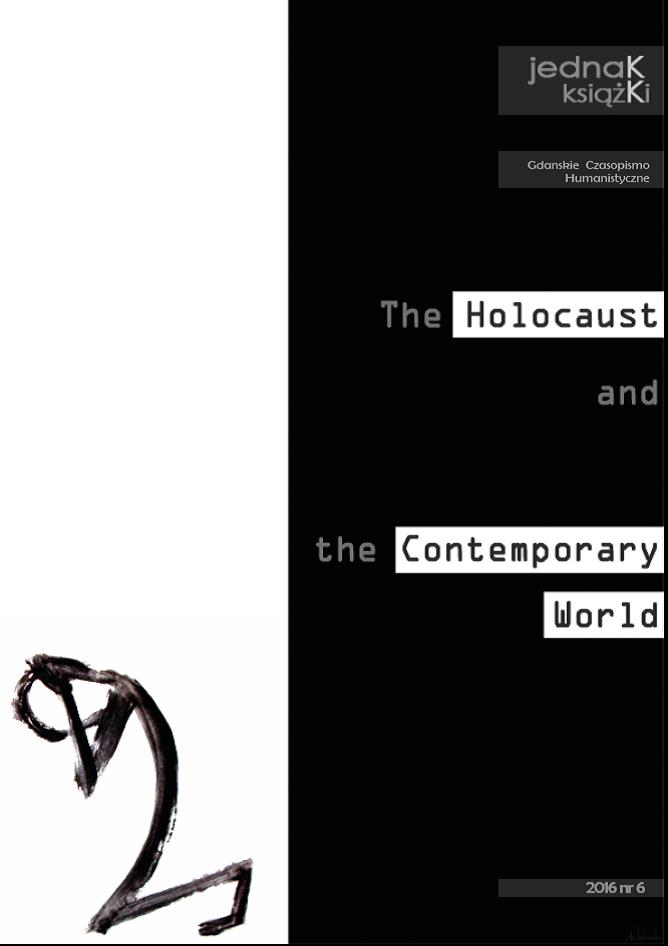Theory of History vis-à-vis two World Wars and the Holocaust
Słowa kluczowe:
theory of history, history as a science, world wars, the Holocaust, critical social theory, ethical turn, power of judgment, Jürgen Habermas, Paul Ricoeur, Raul HilbergAbstrakt
The author poses two questions: Is there anything new that the two World Wars and the Holocaust introduce to the methodology of history or rather to the self-consciousness of history as a scientific discipline? What do these events change in the way we perceive the importance and function of historiography in culture? The article consists of introductory remarks, main text and conclusions. Key considerations are divided into six parts: 1. The First World War and the Turn to Memory, 2. World War Two and the Question about Theory of History, 3. Political Context, 4. The Ethical Turn, 5. Auschwitz, History, and the Power of Judgment, 6. The Hilberg Case.
A reconstruction of the methodological consciousness of history is carried out on the basis of the research categories and attitudes proposed by such authors as Habermas, Ricoeur, Jaspers, and Bourdieu. Using some of these ideas, it culminates in the interpretation of Hilberg’s theory of historiography. The ideas are, among other things, the following: critical theory, ethical turn, power of judgment, non-dualistic epistemology and ontology.
Downloads
Bibliografia
Arendt Hannah. 2006. Eichmann in Jerusalem. A Report on the Banality of Evil. London: Pengiun Books.
Baszkiewicz Jan. 2004. Historia Francji. Wrocław: Ossolineum.
Baszkiewicz Jan. 2009. Władza. Wrocław: Ossolineum.
Bauman Zygmunt. 1989. Modernity and the Holocaust. Cambridge: Polity Press.
Beck Ulrich, Grande Edgar. 2007. Cosmopolitan Europe. Ciaran Cronin, trans. Cambridge: Polity Press.
Benjamin Walter. 2006. The Storyteller. Reflections on the Works of Nikolai Leskov, 361-378. Zohn Harry, trans. In: Hale Dorothy J., ed. The Novel: An Anthology of Criticism and Theory 1900-2000. Malden, Mass.: Blackwell Publishing.
Bourdieu Pierre and Wacquant Loïc J. D. 2001. Zaproszenie do socjologii refleksyjnej. [Invitation a la sociologie reflexive]. Sawisz Anna, trans. Warszawa: Oficyna Naukowa.
Bourdieu Pierre. 2014. Über den Staat. Vorlesungen am College de France 1989-1992. Brüchmann Horst, Willim Petra, trans. Berlin: Suhrkamp.
Dintenfass Michael. 2000. “Truth’s Other: Ethics, the History of the Holocaust, and Historiographical Theory after the Linguistic Turn.” History and Theory 39 (1): 1-20.
Habermas Jürgen. 1974. Dogmatism, Reason, and Decision: On Theory and Praxis in Our Scientific Civilisation. In: Habermas Jürgen. Theory and Praxis. Viertel John, trans. Boston: Bacon Press.
Habermas Jürgen. 1988. “A Kind of Settlement of Damages (Apologetic Tendencies).” Leaman Jeremy, trans. New German Critique 44: 39.
Heller Ágnes. 1999. “The Three Logics of Modernity and the Double-Bind of Imagination.” Graduate Faculty Philosophy Journal 21 (2):177-193.
Hilberg Raul. 1996. The Politics of Memory. The Journey of a Holocaust Historian. Chicago: Ivan R. Dee Publisher.
Hilberg Raul. 2014. Zagłada Żydów europejskich, vol. III. Giebułtowski Jerzy, trans. Warszawa: Wydawnictwo Piotr Stefaniuk.
Hudzik Jan P. 2014. Kwestia interdyscyplinarności w politologii, 247-279. In: Skarzyński Ryszard, ed. Przedmiot poznania politologii. Podstawy dyscypliny nauki. Białystok: Temida 2.
Jaspers Karl. 1959. The Idea of the University. Reiche H. A. T., Vanderschmidt H. F., trans. Boston: Beacon Press Beacon Hill.
Jaspers Karl. 1971. Philosophy of Existence. Grabau Richard F., trans. Philadelphia: University of Pennsylvania Press.
Kelley Donald R. 2006. Frontiers of History. Historical Inquiry in the Twentieth Century. New Haven and London: Yale University Press.
LaCapra Dominick. 1996. Representing the Holocaust: History, Theory, Trauma. Ithaca, New York: Cornell University Press.
LaCapra Dominick. 1998. History and Memory after Auschwitz. Ithaca and London: Cornell University Press.
LaCapra Dominick. 2004. History in Transit. Experience, Identity, Critical Theory. Ithaka, New York: Cornell University Press.
Mazur Zbigniew. 2013. Niemiecka kultura pamięci: ciągłość i zmiana, 209-349. In: Mazur Zbigniew, Orłowski Hubert, Wagińska-Marzec Maria. Kultura zjednoczonych Niemiec. Wybrane problemy. Poznań: Instytut Zachodni.
Nolte Ernst. 1993. The Past That Will Not Pass: A Speech That Could Be Written but Not Delivered, 18-23. In: Forever in the Shadow of Hitler? Original Documents of the Historikerstreit Controversy Concerning the Singularity of the Holocaust. Knowlton James, Cates Truett, trans. New Jersey: Atlantic Heights.
Olick Jeffrey K., Robbins Joyce. 1998. “Social Memory Studies: From ‘Collective Memory’ to the Historical Sociology of Mnemonic Practices.” Annual Review of Sociology 24: 105-140.
Pomian Krzysztof. 1992. Przeszłość jako przedmiot wiedzy. Warszawa: Aletheia.
Ranke Leopold. C. 1901. History of the Popes: their Church and State, vol. II. Fowler E., trans. New York: P. F. Collier & Son.
Rees Laurence. 2008. Their Darkest Hour. People Tested to the Extreme in WW II. London: Ebury Press.
Ricoeur Paul. 2006. Memory, History, Forgetting. Blamey Kathleen, Pellauer David, trans. Chicago: The University of Chicago Press.
Stefaniuk Piotr. 2014. Nota wydawcy. In: Hilberg Raul. Zagłada Żydów europejskich, vol. I. Giebułtowski Jerzy, trans. Warszawa: Wydawnictwo Piotr Stefaniuk.
Stone Dan, ed. 2012. The Holocaust and Historical Methodology. New York, Oxford: Berghan Books.
Taylor Charles. 2007. A Secular Age. Cambridge. Mass: Harvard University Press.
Weber Max. 2012. The meaning of “value freedom” in the sociological and economic sciences, 304-334. In: Collected Methodological Writings. Brunn Hans Henrik, trans. New York: Routledge.
White Hayden. 2004. “Figural Realism in Witness Literature.” Paralax “ 10 (1): .113-124.
Zamorski Krzysztof. 2014. Historia jako przedmiot poznania, 89-138. In: Skarzyński Ryszard, ed. Przedmiot poznania politologii. Podstawy dyscypliny nauki. Białystok: Temida 2.
Zertal Idith. 2005. Israel’s Holocaust and the Politics of Nationhood. Galai Chaya, trans. Cambridge: Cambridge University Press.

 Uniwersyteckie Czasopisma Naukowe
Uniwersyteckie Czasopisma Naukowe




